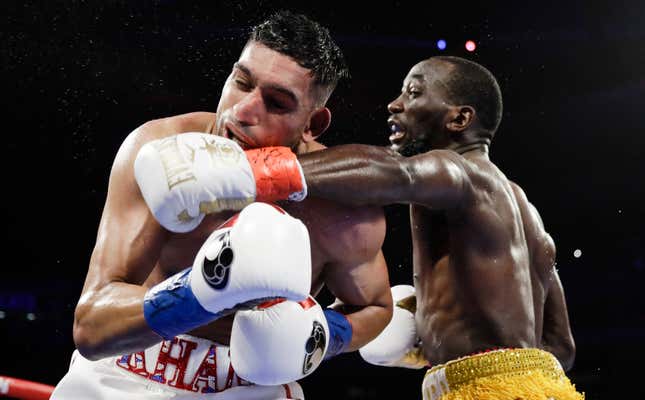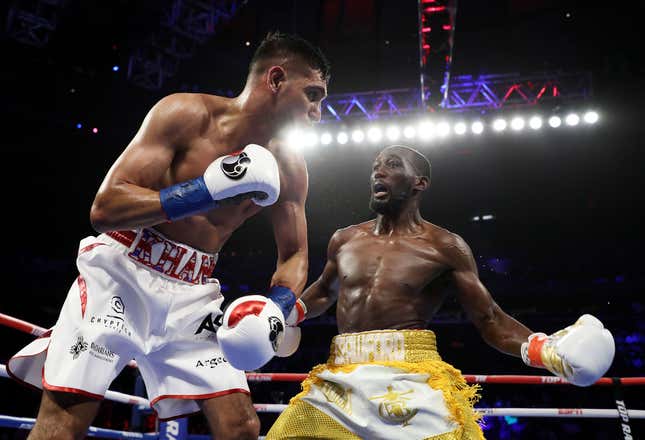
NEW YORK CITY — Terence Crawford is skinny, almost bony, with the gap-toothed smile of a kid who just got caught stealing Honey Buns in the lunchroom. It is kind of an evil smile. He has not spent much effort cultivating the soft fan-friendliness that the best big-money fighters often rub on themselves like lotion, for marketing purposes. Terence Crawford is mean, and you can see right down to the meanness. It is not concealed. You can imagine him as a small, unprepossessing young man who got picked on and turned mean, and has spent the ensuing years taking it out on the world. The world has discovered to its chagrin that that small guy is very good at whipping ass when he wants to. And he wants to. He is gleeful and graceful in equal measure. He skitters across the ring on those skinny legs like a water insect moving across the surface of a pond. And then he stings.
Crawford is either the best or second-best pound-for-pound boxer in the world. With that status can come fame, fortune, entourages of groupies, Ferraris and pet tigers. But what seems to motivate Terence Crawford, fundamentally, is whipping ass. He’s from Omaha and his nickname is “Bud.” There’s not an ounce of effort towards Hollywood. He just does not give any indication that he really cares a ton about becoming an influential figure in American culture. He gives every indication that he cares a ton about not just beating but flagrantly punishing and humiliating everyone who chooses to step in the ring with him.
On Saturday night that victim was Amir Khan, a fighter with world-class skill and world-class heart but whose career has been hobbled by the fact that he both likes to be aggressive and has proven to be very easy to knock out. Khan has a bad chin, as they say, which is not a moral judgment but a simple physiological fact. Fighters who are unable to absorb really big punches must build their boxing style around this fact. Amir Khan has never cared to do so, and thus—though he is as good as the world’s best welterweights—he has been spectacularly knocked out a couple of times. You can see why he doesn’t want to be a defensive fighter. Khan has, I think, the best pure hand speed in all of boxing, meaning that he can get a straight punch from his shoulder to your face faster than just about anyone in the world. His hands are so fast that he often throws flurries of straight shots that make him look like a man riding a hand bike at great speed—bipbipbipbip. He knocks people out with speed rather than power: even if the punch is not extraordinarily hard, it gets to you before you have had a chance to tighten up your muscles, and you drop. Like all flawed superheroes, his speed tends to control him more than he controls it. When he starts letting those punches go he cannot resist leaping forward and trading, his eyes widened by his own ability. That is when he gets in trouble. He is the classic, fearless warrior who dies in the end.
Khan is from Bolton, England, and the Brits were in full force in Madison Square Garden Saturday night. British fight fans love to travel, I assume because everywhere is better than home. The good seats were full of the same types of people, British and American and otherwise: young men who spend a lot of money on professional beard grooming and wardrobe, distressingly tight suits with no tie, Balmain jackets and white shirts with a too-high number of buttons unbuttoned, pumping their arms to the club bangers, junior men on Wall Street or those who pretend to the same lifestyle, the most grating form of man, full of testosterone and grasping for outward symbols of manhood. Boxing matches draw these types, who see the sport as an accessory to be worn like a gold chain. Their immodesty is proof that they have never had the shit kicked out of them as the actual boxers have.
This fight was a very instructive example of the difference between very good boxers and truly great boxers. Amir Khan is very good. And you can see why, immediately, when you watch him fight. His speed is clearly overwhelming. His gifts are apparent to the naked eye. Watch him for two rounds and you understand exactly why he is dangerous.

Terence Crawford, a great fighter, does not present his gifts so fast. As with many great fighters, you might have to watch 10 of his fights to truly get an idea of what makes him so good. Yes, he has all of the physical attributes of a top tier boxer, but there is no sledgehammer power or blinding speed or flashiness that leaps out and says: Here I am, the big gift! Instead, what makes great fighters great is always their mind. They make better decisions than anyone who opposes them. This is why they are impossible to beat. This attribute can lead to many different characters among great fighters, but the attribute itself is universal. For Mayweather, it made him a defensive genius who knew how to do just enough to win rounds; for Andre Ward, it made him a chameleon who tailored each individual fight plan to his opponent; for Crawford, it allows him to read and react to challenges that would destroy lesser fighters. Crawford is meaner than a lot of other great fighters. He has the extra attribute of wanting to not just beat you but hurt you. His use of distance is ethereal. He can get in on taller men, hurt them, and get out without a scratch, all while not seeming to be working too hard at all. He is very loose. He holds his gloves up palms out, patty-cake style, and pokes a lead jab out only halfway; as soon as this draws a reaction jab from his opponent, he pops that jab the rest of the way, over the top. He does this constantly, constantly, and it never fails to work. He is the fly fisherman and his opponent is the fish. That lure never stops looking tasty.
I have no doubt that Amir Khan’s trainer spent the past several months telling him to box carefully and not get too aggressive early in this fight. Despite that, he came out aggressively. It is his nature. In response, he got knocked down in the first round. Crawford looked straight through that trademark Khan straight-ahead flurry and nailed him with a right hand that made him drop. It was such a foreboding start—instant confirmation of everyone’s worst suspicions. Khan seemed to make an effort to restrain himself after that, though it was more like he was being restrained by the force in front of him.
In the third round Crawford switched to southpaw stance. He is one of the very few fighters who is just as good from either side. He makes this switch for purely psychological reasons, just to give Khan one more thing to think about. He was beating him up just fine from the other side, too. You could see Crawford figure out Khan in just over one round, and once he figures you out, his confidence grows, and then he gets bolder. And meaner. By the fourth round he was really digging body shots into Khan with both hands, and sticking his tongue out. When Crawford’s arms start going he looks like a man lashing you with two long rubber poles.
In the sixth, he threw a big, hard left uppercut directly into Khan’s nuts. Khan doubled over in pain, winced for a couple of minutes, and then gave up. He couldn’t continue. That was it. The rule is that if you get hit with a low blow you have five minutes to recover, and then, if you can’t recover, it’s a TKO. So this is how Khan lost. On the one hand, he was being thoroughly and violently dominated, and was probably happy to accept this invitation to stop the fight; on the other hand, you must admit that this part of the rules of boxing leaves something to be desired in terms of fairness, because it creates little incentive not to hit someone in the nuts as hard as you can, just to see if you can make them explode. This is a topic for another day.
In the post-fight interview, Khan was covered with bloody scratches across his shoulders. He was dominated, and he knew it. He gave ample credit to Terence Crawford’s skills. And what did Terence Crawford say about the man he had just defeated—the man whose trademark is his great speed? He said: “Benavidez and Gamboa were 10 times faster than him.” Benavidez, when he fought Crawford, was wearing a huge knee brace and could barely move his leg.
Now that’s a mean motherfucker.